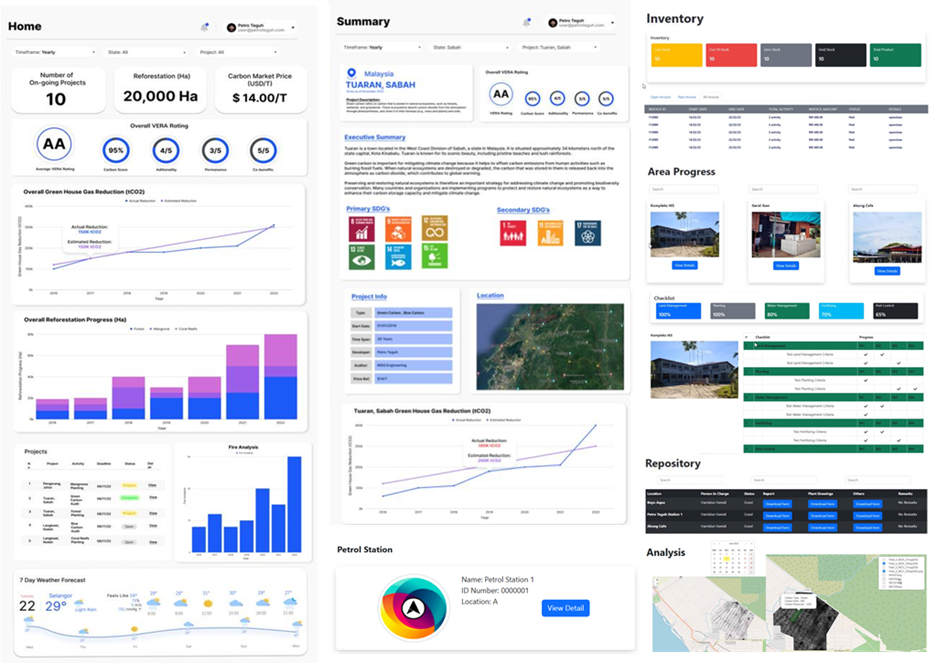
CARBON CREDIT
PROJECT MANAGEMENT & CONSULTATION
The Carbon Credit Project Management and Consultation is a comprehensive solution to address the challenges of monitoring, verifying, and reporting emissions reductions for carbon credit projects. This project including the innovative system will revolutionize the carbon credit ecosystem, fostering transparency, accuracy, and accountability while contributing significantly to global climate change mitigation efforts.
In the case of a feasibility study for a carbon credit project management and consultation initiative, the primary goal is to determine whether establishing and operating such a venture is practical, financially sound, and aligned with the broader goals of mitigating climate change. The project aligns with the organization's strategic goals, values, and mission. It ensures that the project is consistent with the long-term vision of the entity.
By conducting a thorough analysis of various factors, it helps identify potential risks and challenges that could arise during project implementation. This allows the project team to develop strategies to mitigate or manage these risks effectively. The financial, human, and technological resources required to launch and operate the project. This information is crucial for budgeting, resource allocation, and overall project planning.
CARBON CREDIT MARKET OVERVIEW
The carbon credit market is a global platform where organizations and governments buy and sell carbon credits as a means of mitigating their greenhouse gas emissions. Carbon credits are generated by projects that reduce or offset emissions, and they can be traded to help entities achieve their emission reduction targets. The size of the carbon credit market has varied over the years and is influenced by factors such as regulatory changes, market demand, and international climate agreements. In the early 2000s, the market saw rapid growth with the implementation of the Kyoto Protocol, which established the Clean Development Mechanism (CDM) allowing industrialized countries to invest in emission reduction projects in developing countries. However, the market faced challenges, including an oversupply of credits and fluctuating prices.
CARBON CREDIT OVERVIEW
WHAT IS CARBON CREDIT?
*************************
Carbon credits, also known as carbon offsets, are permits that allow the owner to emit a certain amount of carbon dioxide or other greenhouse gases. One credit permits the emission of one ton of carbon dioxide or the equivalent in other greenhouse gases.
The carbon credit is half of a so-called cap-and-trade program. Companies that pollute are awarded credits that allow them to continue to pollute up to a certain limit, which is reduced periodically.
Meanwhile, the company may sell any unneeded credits to another company that needs them. Private companies are thus doubly incentivized to reduce greenhouse emissions.
First, they must spend money on extra credits if their emissions exceed the cap. Second, they can make money by reducing their emissions and selling their excess allowances.
Proponents of the carbon credit system say that it leads to measurable, verifiable emission reductions from certified climate action projects, and that these projects reduce, remove, or avoid greenhouse gas (GHG) emissions.
CARBON CREDIT APPROACH
****************************
Short term – establish and document all effort for VCM. Establish a model of net-zero company by adopting and adapting to SDG and ESG Goals through activities.
Long Term– develop a national team expert for Carbon Credits and Carbon Trade and expand the Carbon Trade internationally.
Medium Term - Establish areas for Carbon Credits through a carbon crediting system and Through Bursa Malaysia’s VCM exchange, both buyers and suppliers will be able to transact high-quality carbon credits at transparent prices.
CARBON CREDITS WORK
*************************
The intention is to reduce the number of credits over time, thus incentivizing companies to find innovative ways to reduce greenhouse gas emissions.
CARBON CREDIT METHODOLOGY
********************************
Carbon credit methodology refers to the systematic approach used to calculate and verify the amount of greenhouse gas emissions reduced or removed from the atmosphere by a specific project or activity. Carbon credits are a key component of emissions trading and carbon offset programs aimed at mitigating climate change. It also to incorporate frameworks and tools for assessment, verification, and certification for carbon credits.
CARBON CREDIT TYPES
***********************
Green carbon - Carbon that is contained in living vegetation and soil in forest ecosystems of the terrestrial realm
Blue carbon - Carbon stored in coastal and marine ecosystems, such as mangroves, tidal marshes and seagrass meadows
CARBON CREDIT PROJECT MONITORING SYSTEM SOLUTION
Our proposed Carbon Credit Project Monitoring System offers a holistic solution that combines cutting-edge technology with a user-friendly interface. The system automates emissions calculations, provides real-time tracking and verification, and offers comprehensive reporting. By streamlining data collection, verification, and reporting, the system will enhance the credibility and effectiveness of carbon credit projects.
TECHNOLOGY COMPLEMENTS
The system leverages advanced algorithms, data security protocols, and real-time data analytics. It complements existing project management tools and databases, ensuring seamless integration with established workflows while offering an intuitive and user-centric experience for stakeholders. The Carbon Credit Project Monitoring System complements the proposed services by providing a comprehensive and technologically advanced solution to address the challenges associated with monitoring, verifying, and reporting emissions reductions for carbon credit projects

CARBON CREDIT EXPECTED IMPACT
The successful implementation of the Carbon Credit Project Monitoring System will lead to increased transparency, accuracy, and accountability in carbon credit projects. This will foster greater trust among stakeholders, encourage wider participation in emission reduction initiatives, and contribute significantly to global efforts in combating climate change.


